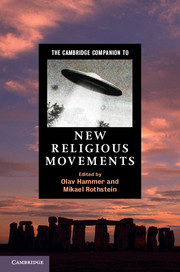Book contents
- Frontmatter
- Introduction to new religious movements
- Part I Social science perspectives
- Part II Themes
- 4 History and the end of time in new religions
- 5 Charismatic leaders in new religions
- 6 Rituals in new religions
- 7 Canonical and extracanonical texts in new religions
- Part III New religious movements
- Index
- Other titles in the series
5 - Charismatic leaders in new religions
from Part II - Themes
Published online by Cambridge University Press: 28 September 2012
- Frontmatter
- Introduction to new religious movements
- Part I Social science perspectives
- Part II Themes
- 4 History and the end of time in new religions
- 5 Charismatic leaders in new religions
- 6 Rituals in new religions
- 7 Canonical and extracanonical texts in new religions
- Part III New religious movements
- Index
- Other titles in the series
Summary
Charismatic leadership is a common, but not a necessary, characteristic of a “new religious movement,” understood here as a religion that is either emergent or alternative in a given cultural context. Emergent movements arise from within old traditions, or represent innovative combinations of characteristics from different traditions. Alternative religions include old religious traditions, which are revived, rediscovered or transplanted to a new cultural context. Although charismatic leadership is often associated with new and unconventional movements, charismatic religious leadership and charismatic political leadership go back to the origins of human religious creativity.
Charismatic religious leadership appears to be unconventional in cultures where religious authority has been channeled into offices obtained through authorization by institutionalized bodies and/or leaders. Some cultures have devised means to recognize charismatic religious authority within established institutions, but these expressions of leadership look exotic and alternative when the religion is transplanted to a new context.
“Charisma” may be understood as referring to a characteristic attributed by believers to an individual, scripture, place, or other social construct. Usually the term is used to refer to qualities possessed by a leader. In these instances, the belief is that the leader has access to an unseen source of authority. If charisma is attributed to a scripture or a place, likewise, it is regarded as imbued with the qualities of a source of authority that is normally unseen, but which reveals itself to particular individuals.
- Type
- Chapter
- Information
- The Cambridge Companion to New Religious Movements , pp. 80 - 96Publisher: Cambridge University PressPrint publication year: 2012
- 19
- Cited by



